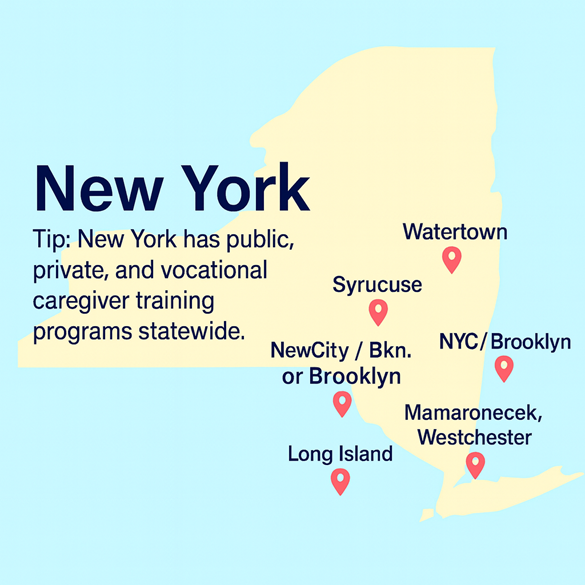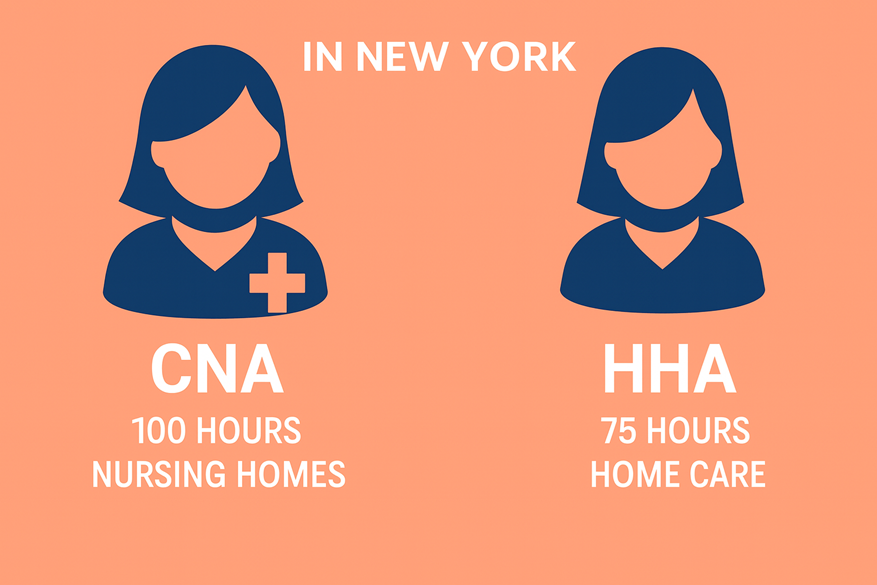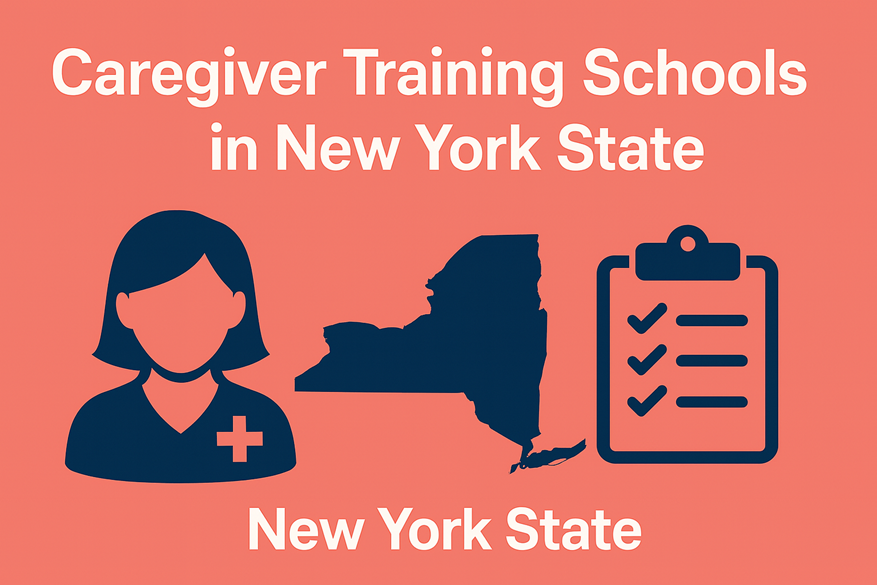Thinking about becoming a Certified Nursing Assistant (CNA) or Home Health Aide (HHA) in New York? You’re not alone. Whether you’re switching careers or stepping into healthcare for the first time, caregiving is a meaningful, hands-on path where you can make a real difference. New York offers plenty of training options—whether you’re based in a busy city like Brooklyn or a quieter area like Albany.
This guide breaks down where to find caregiver training schools, what programs are available, how CNA and HHA paths differ, and what job demand looks like across the state in 2025. If you’re ready to learn, New York is ready to train you.
Public & Private Colleges in New York

Several public community colleges and private institutions across the state offer CNA or HHA programs. These programs often come with a strong reputation, structured curricula, and access to resources like tutoring or job placement support.
Community colleges like CUNY and SUNY branches typically provide CNA programs through their continuing education departments. Many private colleges partner with local hospitals or home care agencies to offer hands-on training.
Here are a few examples of colleges offering caregiver programs:
Vocational & Career Schools in New York
These Vocational schools are a popular choice for students who want fast, hands-on training in small class sizes. These schools often offer day, evening, and weekend classes to work around your schedule. Many also include job placement help or connections to local healthcare employers.
Whether you’re in the Bronx, Queens, or on Long Island, you can likely find a vocational caregiver training center nearby. These programs tend to focus on practical skills and are often completed in less than two months.
CNA vs HHA in New York: What’s the Difference?

In New York, CNAs and HHAs both care for people who need help—but the roles differ in training, scope, and settings.
Certified Nursing Assistant (CNA):
- Training Hours: 100 hours minimum (including 30 hours clinical)
- Registry: Must pass the New York CNA exam and be listed on the NYS Nurse Aide Registry
- Work Settings: Nursing homes, hospitals, long-term care facilities
- Main Tasks: Vital signs, transferring patients, assisting nurses, feeding, bathing
Home Health Aide (HHA):
- Training Hours: 75 hours minimum (including 16 hours practical training)
- Registry: Must complete HHA training from a state-approved provider; no written exam required
- Work Settings: Client homes, home health agencies
- Main Tasks: Bathing, grooming, light housekeeping, meal prep, medication reminders
Both roles involve direct care and emotional support, but CNAs generally handle more clinical duties in facility settings, while HHAs work one-on-one in private homes.
What About PCA in New York?
Personal Care Aides (PCAs) provide essential support for clients who need help with basic daily living tasks, but typically require less medical or hands-on assistance than what CNAs or HHAs provide. In New York, PCAs are commonly employed by licensed home care services agencies (LHCSAs), especially for Medicaid-funded home care services.
Training Requirements:
- Minimum of 40 hours of instruction
- Training must be completed at a New York State Department of Health-approved program
- No written exam is required
- Certification is usually issued directly by the training provider or agency
Typical Tasks:
- Helping with bathing, dressing, and grooming
- Light housekeeping and laundry
- Meal preparation
- Grocery shopping and errands
- Escorting to medical appointments
Work Settings:
- Private homes
- Home care agencies
- Community-based settings under Medicaid programs
Key Difference: PCAs cannot provide medical-related tasks such as checking vital signs or assisting with mobility the way CNAs or HHAs can. However, many PCAs later upgrade their training to become HHAs, which opens up more job opportunities.
Job Market for Caregivers in New York (August 2025)
As of August 2025, New York continues to have one of the highest demands for direct care workers in the country. The aging population, especially in New York City and surrounding counties, has created steady job openings in nursing homes, hospitals, and home care agencies.
Salary Range (2025 Estimates):
- Certified Nursing Assistant (CNA):
$36,000 to $46,000 per year
($17–22 per hour depending on region and experience) - Home Health Aide (HHA):
$32,000 to $41,000 per year
($15–20 per hour, often higher in NYC)
Job Outlook:
New York’s Department of Labor projects over 30,000 annual job openings for HHAs and CNAs combined through 2026. Areas like Queens, Westchester County, and Buffalo show growing demand for multilingual caregivers and those with additional credentials like dementia training or CPR.
How to Get Certified in New York
For CNAs:
- Complete a State-Approved CNA Training Program
- Pass the CNA Certification Exam (Written + Skills)
- Get Listed on the NYS Nurse Aide Registry
- Managed by Prometric on behalf of the NY State Department of Health
- Renew Every 2 Years with verification of paid employment
For HHAs:
- Complete an NYSDOH-Approved HHA Training Program
- At least 75 hours with 16 hours clinical instruction
- Get Certified Through the Training Provider
- No state exam required; certification issued by the training school
- Get Listed with the NY Home Care Registry
- Employers use this registry to verify active certification
- No Renewal Exam, but continued employment and agency compliance is expected
Important Note: Background checks and TB tests are typically required before clinical training starts.
Take the First Step Toward a Caregiving Career
If you’re ready to enter a field that’s all about helping others, caregiving in New York is a solid place to start. Whether you’re leaning toward becoming a CNA in a hospital or an HHA supporting clients at home, the training is doable and rewarding. With schools all across the state and a strong job market, there’s no better time to enroll, learn, and begin making a difference.
Choose a program that fits your schedule, budget, and goals—and take that first step today.
Disclaimer
Program availability, tuition, and requirements may change over time. Please verify all information with the school directly and confirm certification procedures with the New York State Department of Health or other official sources.
Sources
- New York State Department of Health – Home Health Aide Training
- NYS Nurse Aide Registry (Prometric)
- New York State Department of Labor – Occupation Outlook
- U.S. Bureau of Labor Statistics – CNA and HHA Salary Data
- Borough of Manhattan Community College – CNA Training
- LaGuardia Community College – CNA Program
- ABC Training Center
- Access Careers
- Royal Learning Institute
Notice a Correction?
If you are a representative or student of one of the schools listed above and notice any outdated or incorrect information, please feel free to contact us using our contact form here. We’re happy to update program details, links, or offerings to ensure this resource stays accurate and helpful for future caregivers.

